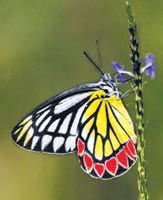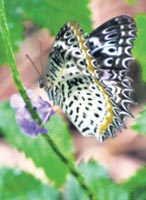|
Flitting
from one beauty to another
Butterflies Of Sri Lanka For Children
by Dr. Sriyanie Miththapala. Reviewed by Goolbai Gunasekara
Nature gives us many gifts but in each
person’s life there is one magic moment, the image
of which remains in memory forever. Such a moment was
mine when I was 7 years old, playing cricket with a
childhood friend, Aubrey Jansz , on a by-road off Bambalapitiya.
“I’ll bat. Can you throw
a ball?” he asked in lordly fashion.
 |
| Common Jezebel. Pic by Gehan de
Silva Wijeyeratne |
“Yes.” I was humble in
the presence of such sports superiority.
One ball was bowled (sorry, ‘thrown’)
but before Aubrey could thwack it over the house into
the next garden, we had to stop play in mid-swipe so
to speak for unexpectedly,with mesmerizing suddenness
there appeared at the end of the path, a golden ball
rolling inexorably towards us. Within minutes we were
enveloped in clouds of yellow. In retrospect, Wordsworth’s
words on Daffodils, ‘fluttering and dancing in
the breeze’ are the best description of those
thrilling 20 minutes when hordes of these airy, seemingly
ephemeral creatures, swarmed about our enchanted selves
before rising over the dark leaves of a Mara tree in
front of their path and vanishing from view. It was
magic.
No one could tell me anything about
the phenomenon.
“On their way to Samanala Kanda’”
said our prosaic driver……. Alas, no one
believed him. It so happens he was quite right although
at the time my father dismissed the driver’s verdict
as romantic nonsense. But it was only when I opened
Dr. Sriyanie Miththapala’s fascinating book “Butterflies
of Sri Lanka for Children” that I found our poor
driver’s pronouncement vindicated at last for
right there, on page 24, lay my answer.
 |
| Lacewing. Pic by Prasantha Paranagama
|
“During April and May”
ran the text, “there is a spectacular movement
of Lemon Emigrants up on to Adam’s Peak, also
called Samanala Kanda which means Butterfly Hill in
Sinhala. People believe these butterflies go, with pilgrims,
to pay homage to Lord Buddha.” Another instance
where legend and fact meet.
For a non-scientist to review a book
of so obviously a scientific nature may seem a trifle
strange. It is this very reason that makes me suitable
for the job. For if an Arts oriented being can find
its pages fascinating so will all others who read it.
Another reason for this review is that I have always
been a great, albeit distant admirer, of the erudite
Miththapalas…father, mother and also a brother
whose expertise on elephants has occasionally caused
him to really wonder how it is possible for a Principal
of a school to ask the kind of silly questions that
I do.
“Butterflies….”
is mainly for children but adults who want to know something
of a subject (of which there is precious little written
) will find that within its covers there is much informative
and artistic satisfaction to be gained.
Gehan de Silva Wijeyeratne’s
photographs illustrating the book are simply lovely.
They must have taken years to collect and each one is
a work of art.
See a black and white ‘Tree
Nymph’ highlighted against dark foliage or a ‘Plain
Tiger’ with outspread wings posed against a mass
of light green leaves. These are pictures a child will
never forget and it is for children that Dr. Miththapala
has written this book.
It is simply phrased and therefore
easily absorbed. The wealth of information is made easily
digestible by the addition of little stories and legends
connected with several butterflies. ‘Jezebel’
for example has been so named with the Bible seductress
in mind and it is well named indeed for the alluring
colours of its wings must surely have been Jezebel’s
choice of attire. And did you know that the ‘Lace
Wing” is poisonous? In fact did anyone know that
there exist poisonous butterflies at all?
From the point of view of a teacher
I would confidently tell Librarians of schools and all
Institutes of Learning to add copies of ‘Butterflies….’
to their shelves. It is instructive without being boring.
It is colourfully and highly attractively laid out.
It contains a wealth of information presented in an
interest-catching manner. Dr. Miththapala well understands
the mind of a child. As a former Principal of Ladies’
College one may expect this but Principals of schools
do not necessarily find it easy to reach down into the
minds of juniors and even middle schoolers. In addition
to having this enviable ability, Dr. Miththapala’s
awesome academic attainments place her in a category
of scholar who would cater to the most erudite students
in Universities. As a Smithsonian Research Associate,
her publications range from scientific papers to articles
and books on Natural History. It is her belief that
in the writing of books aimed at children she is furthering
the cause of ecological conservation for as she says,
“Children are excellent Ambassadors of conservation
education.”
From a personal point of view, I find
that ‘Butterflies of Sri Lanka for Children”
will make wonderful Prize Books for little scholars
of any school so excuse me while I rush out and buy
up a dozen copies of what (I’m told) is a limited
supply.
‘Butterflies of Sri Lanka’
takes wing
By Dhananjani Silva
'Butterflies of Sri Lanka for Children'
by Dr. Sriyanie Miththapala was launched on Thursday,
September 28, at The Lakshman Kadirgamar Institute of
International Relations and Strategic Studies. The chief
guest for the event was renowned actress and Irangani
Serasinghe, founder member of Ruk Rakaganno and also
member of numerous other conservation groups.
The event began with the ceremonial
lighting of the traditional oil lamp by Mrs. Serasinghe,
the Chairman Singer Sri Lanka Hemaka Amarasooriya, (Singer
being the main sponsors of the event), Coordinator Asia
Regional Species Programme, The World Conservation (IUCN)
Dr. Channa Bambaradeniya and Dr. Sriyanie Miththapala.
 |
| The author presenting a book to
her father. |
Delivering the keynote address Dr.
Bambaradeniya said that Dr. Miththapala hailing from
a family of ardent naturalists, contributes immensely
towards environmental and biology conservation playing
multiple roles; as an active environmentalist, researcher,
illustrator, initiator of many projects and visiting
lecturer in many universities on environmental related
subjects.
One-third of Sri Lanka's butterflies
are threatened due to reasons such as loss of habitat,
pollution, over collection etc, he said, adding that
there was a need to raise awareness on the issue. "There
are no publications on butterflies targeting children,
so this book will generate an interest on butterflies
among children," he said.
Dr. Miththapala too said that her
purpose in writing 'Butterflies of Sri Lanka for Children'
is to promote a child's interest in butterflies and
by doing so to be a part of wild life conservation.
Commenting about the book, Mrs. Serasinghe
said that besides the simple language in which it is
written, the layouts and illustrations are remarkable.
"This is a must read for children," she said.
"It is a wonderful thing that
Singer Sri Lanka has come into the forefront in an event
of this nature. I was surprised that a corporate body
is interested in such an aspect, especially about butterflies,"
she said.
| 